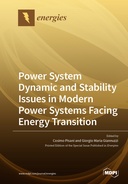Explore

Power System Dynamic and Stability Issues in Modern Power Systems Facing Energy Transition
0 Ungluers have
Faved this Work
Login to Fave
Dynamic stability basically deals with the interactions between the system's components. Following a disturbance, the system's variables undergo transitions that can induce oscillations in active and reactive power generation, resulting in the occurrence of voltage oscillatory modes and frequency deviation in the system. Depending on the entity of the disturbance, the small- or large-signal stability of the system under consideration can be investigated. The introduction of RES-based generation that does not participate in the network services (i.e., frequency and voltage regulation) due to lack of special controls will undoubtedly affect both the overall frequency and voltage stability. Large-scale transient stability is also a concern not to be overlooked: inverter-based wind and solar generation have different angle/speed swing behaviors with respect to traditional generation due to reduced inertia, different voltage swing behaviors due to different voltage control systems, different power flow patterns, and different displacements of synchronous generation at key locations. Therefore, although power system stability and dynamics have played a very central role in the management and study of electrical power systems thus far, it is also true that the emerging scenario requires new methodologies, technologies, and analyses. In this light, the current Special Issue aims to collect contributions (i.e., research papers and review articles) on power system dynamics and stability from experts in academia and industry.
This book is included in DOAB.
Why read this book? Have your say.
You must be logged in to comment.
